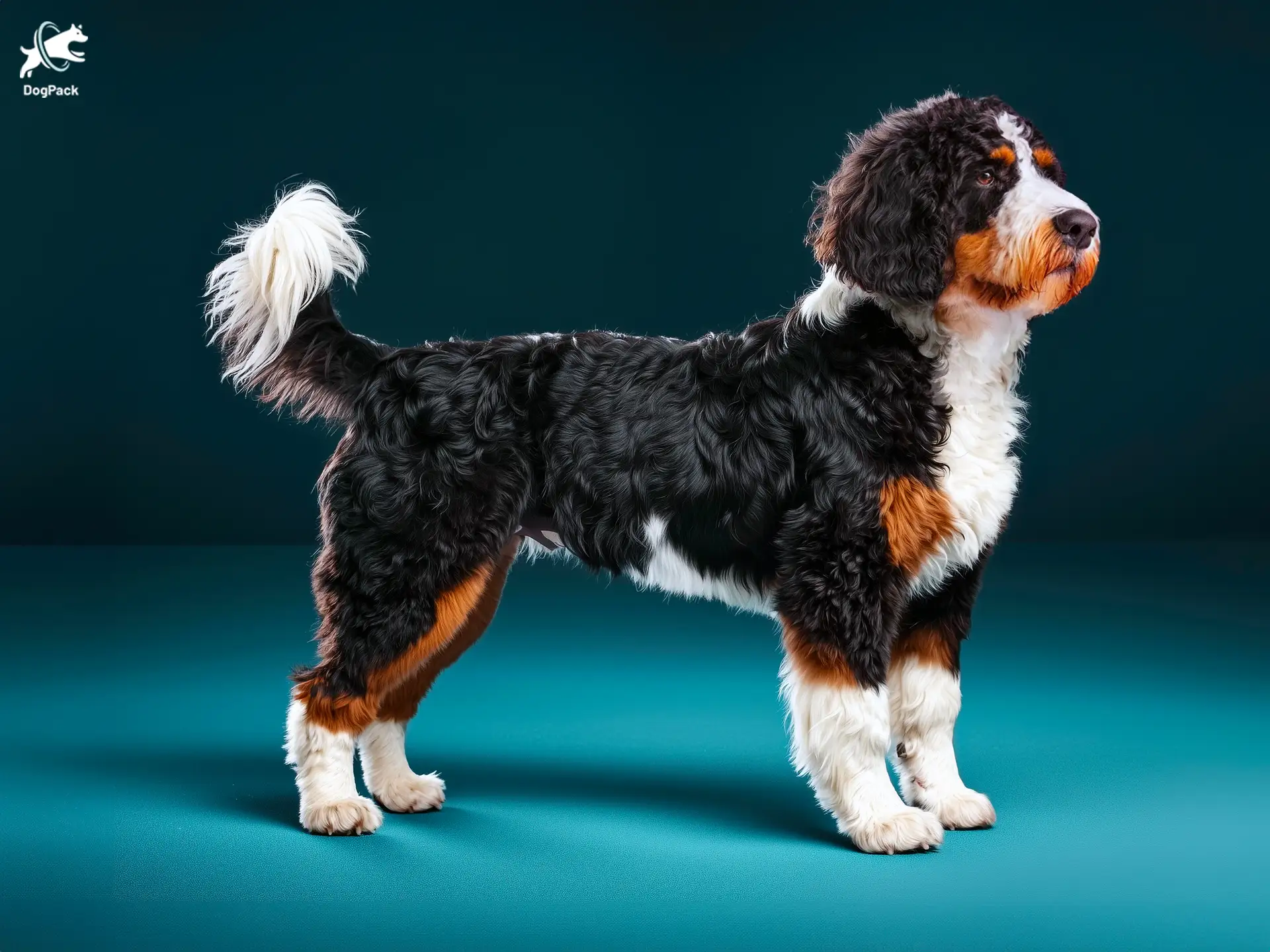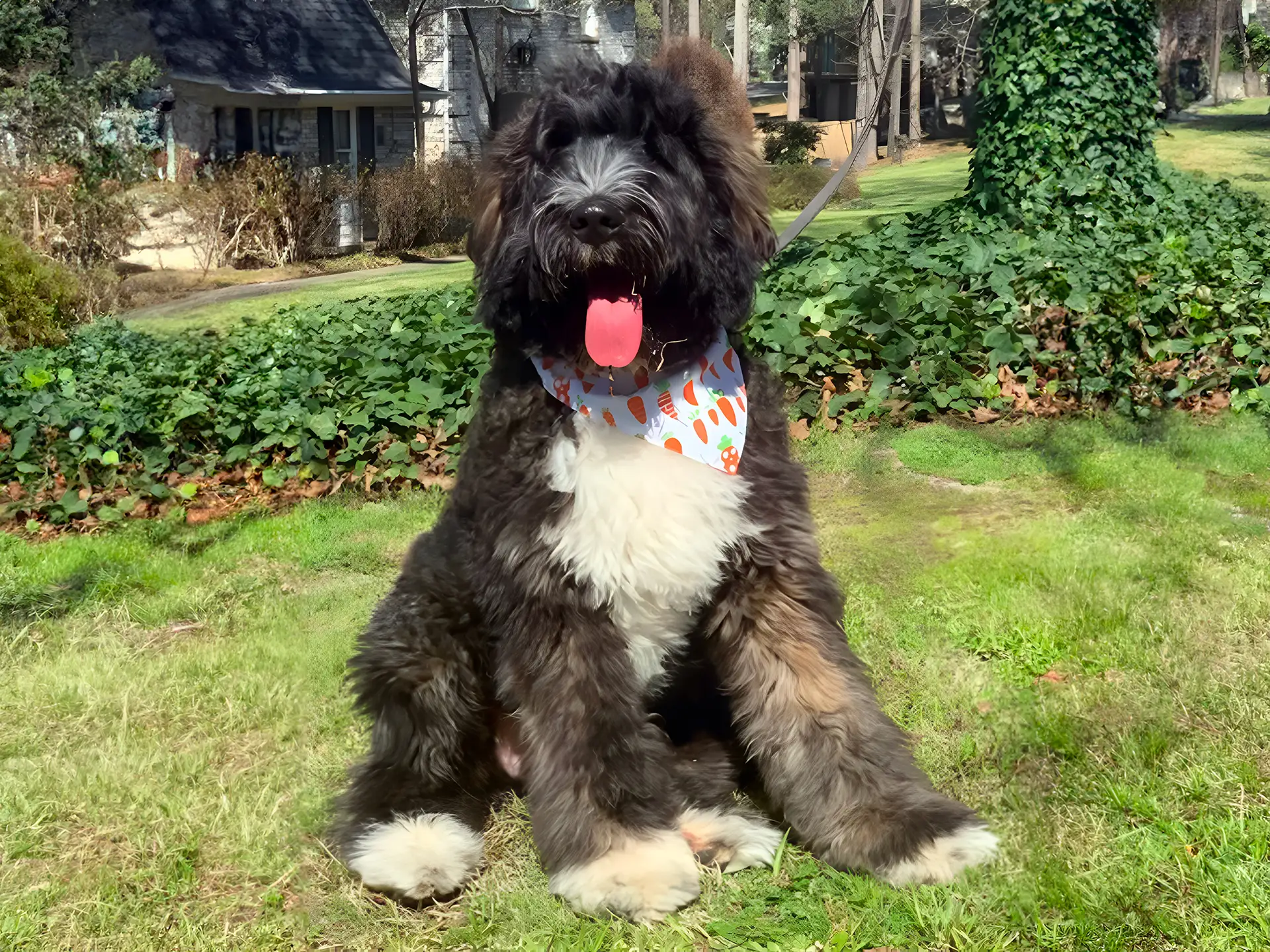Bernedoodle Dog Breed Info & Overview
Ever heard of a dog that’s part teddy bear, part Einstein, and 100% heart? Meet the Bernedoodle! This lovable mix combines the best traits of the Bernese Mountain Dog and the Poodle, resulting in a companion that’s as affectionate as it is intelligent. They’re the kind of dogs that make you wonder how you ever lived without them. Whether you’re looking for a low-shedding dog or a loyal friend, this breed fits right in!
Characteristics
Pictures
Breed History
The Bernedoodle is a relatively new hybrid, intentionally bred to combine the desirable qualities of the Bernese Mountain Dog and the Poodle. It first appeared in the early 2000s, with the goal of creating a dog that possessed the Bernese’s calm and gentle demeanor, paired with the Poodle’s intelligence and low-shedding coat. This crossbreed aimed to provide an ideal companion for families and individuals alike.
Originating in North America, the Bernedoodle quickly gained attention for its affectionate nature and striking appearance. The combination of health benefits from hybrid vigor and its adaptability in various households contributed to its growing popularity. Breeders have focused on producing a dog that is not only charming in looks but also healthier than many purebred dogs.
Although the Bernedoodle is not recognized by major kennel clubs, due to its status as a hybrid breed, it has garnered a significant following. Several breed-specific clubs have emerged, focusing on the standardization of its characteristics, ensuring that future generations maintain the breed’s signature traits and personality.
Temperament, Personality
Bernedoodles are renowned for their affectionate and social nature. They are happiest when they are part of family life, enjoying every moment of interaction with their humans. Their warm and playful demeanor makes them especially suited for homes with children, as they are known to be gentle and patient.
With intelligence inherited from the Poodle and loyalty from the Bernese Mountain Dog, Bernedoodles are both highly trainable and eager to please. They thrive in structured environments where they can learn new commands and tasks, making them a joy to train for both novice and experienced dog owners. Their strong desire to form close bonds with their family leads to a devoted, loyal pet.
Proper socialization from an early age is key to helping Bernedoodles adjust well to various environments. Introducing them to different people, animals, and settings ensures they grow into confident, well-rounded dogs, comfortable with new experiences and adaptable in diverse situations.
Physical Characteristics
Bernedoodles come in a wide range of sizes, depending on the type of Poodle parent involved in the cross. These sizes range from the petite Toy Bernedoodle, which stands around 12 to 17 inches, to the larger Standard Bernedoodle, which can reach 29 inches in height. Weights can vary from 25 to 90 pounds, reflecting the diversity within the breed.
Their coats can be wavy or curly, often reflecting the low-shedding quality of the Poodle. Colors are just as varied, with solid black, white, or brown being common, along with the striking tri-color patterns of the Bernese Mountain Dog. This tri-color coat is one of the Bernedoodle’s most recognizable features, often making them stand out in a crowd.
Physically, Bernedoodles blend the best of both parent breeds. Their expressive eyes and fluffy, soft coat give them an undeniably cute appearance. Each Bernedoodle has a unique look, but they consistently maintain a balanced, sturdy structure with a combination of elegance and playfulness.
Health Issues
While Bernedoodles benefit from hybrid vigor, they can still inherit some health issues from their parent breeds. One of the most common concerns is hip and elbow dysplasia, particularly from the Bernese Mountain Dog side. Regular exercise and maintaining a healthy weight are crucial in reducing the risk of joint issues as they age.
In addition to joint problems, Bernedoodles may face eye conditions such as progressive retinal atrophy, which can affect vision over time. Skin allergies and hot spots may also occur, requiring careful management of their grooming routine and environment. Regular check-ups with your veterinarian will help catch and address these issues early.
Choosing a reputable breeder who conducts health testing on the parent dogs is essential to minimizing genetic health risks. Screening for joint, eye, and heart conditions in both the Bernese Mountain Dog and Poodle can significantly improve your Bernedoodle’s chances of leading a long, healthy life.
Grooming Needs
Due to their wavy or curly coats, Bernedoodles have moderate to high grooming requirements. To keep their coat healthy and prevent mats, regular brushing—at least three times a week—is necessary. This not only keeps their fur looking its best but also minimizes the risk of skin irritation beneath their dense coat.
Many Bernedoodle owners opt for professional grooming every 6 to 8 weeks, which includes trimming, bathing, and ear cleaning. Keeping their coat trimmed ensures it doesn’t become too long or unruly. Additionally, regular ear cleaning is crucial, as their floppy ears can be prone to infections if not properly cared for.
Despite their low-shedding coat, regular grooming is still essential to reduce dander and loose hair, making them a suitable option for people with mild allergies. Maintaining a consistent grooming routine will ensure your Bernedoodle remains clean, comfortable, and free from potential skin issues.
Exercise Requirements
Bernedoodles are an energetic breed that requires daily physical and mental stimulation. While their activity levels can vary depending on their size and individual temperament, they generally need a combination of moderate exercise and play to stay happy. A daily walk combined with engaging activities like fetch, hiking, or even agility training will help meet their exercise needs.
Mental stimulation is just as important for this intelligent breed. Puzzle toys, training sessions, or games that challenge their mind can prevent boredom and reduce the likelihood of destructive behaviors. Bernedoodles enjoy activities that allow them to bond with their owners, making playtime a fun and rewarding experience.
Without adequate exercise, Bernedoodles may become restless or exhibit unwanted behaviors such as chewing or digging. Ensuring they have enough physical and mental activity each day will keep them content, well-behaved, and mentally stimulated, making them a delightful companion.
Training Tips
Bernedoodles are highly intelligent and eager to learn, which makes training an enjoyable experience for most owners. Their mixed heritage, combining the intelligence of the Poodle with the gentleness of the Bernese Mountain Dog, results in a dog that is quick to pick up commands and thrives with positive reinforcement techniques.
Consistency and early training are essential to shaping good behavior in your Bernedoodle. Beginning with basic obedience training and socialization at a young age ensures that your dog will develop confidence in various environments. Gradual exposure to different people, pets, and situations helps prevent anxiety and unwanted behaviors.
It’s important to note that Bernedoodles can be sensitive, so patience and gentle guidance work far better than harsh training methods. Responding well to praise and treats, this breed is eager to please. Establishing a training routine with rewards will foster a strong bond between you and your Bernedoodle.
Nutrition, Diet
Maintaining a balanced diet is vital for a Bernedoodle’s long-term health and energy levels. Their diet should include high-quality kibble, ideally tailored to their size, activity level, and age. On average, a Bernedoodle may require 2 to 4 cups of food daily, but you should adjust based on factors like weight and exercise.
Each Bernedoodle is unique, meaning that some may have different dietary needs based on genetics or health conditions. Consulting with your veterinarian is crucial to identifying the best diet, whether it’s dry food, wet food, or a combination, to keep your Bernedoodle in optimal health.
Given their large breed heritage, Bernedoodles are prone to joint issues like hip dysplasia. Including supplements such as glucosamine and chondroitin in their diet can support healthy bones and joints. Your vet may also suggest specific foods designed to address these needs.
Adoption, Breeders
If you’re considering a Bernedoodle, it’s important to find a reputable breeder who focuses on the health and well-being of their dogs. Look for breeders who conduct health tests on both parent breeds to ensure the puppies are free from genetic conditions. Meeting the parent dogs is also recommended to assess temperament.
Adoption is another fantastic route to explore. Many Bernedoodles are available for adoption through breed-specific rescues or general animal shelters. Websites like Petfinder and Adopt-a-Pet can connect you with rescue dogs looking for their forever homes, offering a second chance to a deserving Bernedoodle.
Avoid puppy mills or breeders who prioritize profit over the health of their dogs. Ethical breeders will provide health guarantees, proper socialization, and transparent practices. Doing your research will help ensure you bring home a healthy, happy Bernedoodle.
Family Pet?
The Bernedoodle’s affectionate and playful nature makes it a wonderful family companion. They tend to form strong bonds with family members and are particularly fond of children. Their gentle temperament makes them an ideal playmate for kids, though supervision is always recommended with young children.
Bernedoodles are also known for their sociability with other pets, especially when properly socialized from an early age. Whether you have cats, other dogs, or smaller pets, a well-adjusted Bernedoodle can integrate smoothly into a multi-pet household.
Their adaptable personality allows them to thrive in a variety of family settings, whether you’re a busy household or prefer a quieter home. As long as they receive enough attention, love, and playtime, they will quickly become a cherished member of your family.
Right For You?
A Bernedoodle might be the perfect choice for individuals or families looking for a loyal, intelligent, and affectionate companion. They thrive in active households where they can participate in outdoor adventures and regular playtime. Their love for people makes them excellent companions for those who can spend plenty of time with them.
Grooming is an essential part of owning a Bernedoodle, especially for those with curlier coats. Be prepared for regular grooming sessions to keep their coat free of mats and tangles. They also require moderate exercise to stay healthy and happy, making daily walks and playtime a must.
If you’re ready to provide the care, attention, and love a Bernedoodle needs, they will reward you with years of companionship and loyalty. This breed is well-suited for owners who can commit to their physical and emotional needs, ensuring they thrive in their new home.
Conclusion
Bernedoodles combine the best traits of the Bernese Mountain Dog and the Poodle, resulting in a friendly, intelligent, and affectionate companion. Their adaptability and loving nature make them suitable for a variety of households, from active families to first-time dog owners. With proper care, training, and love, a Bernedoodle can be a wonderful addition to your life.
FAQs
-
Do Bernedoodles make good therapy dogs?
Yes, Bernedoodles often make excellent therapy dogs due to their gentle and empathetic nature. Their intelligence and friendly demeanor allow them to connect well with people in need of emotional support.
-
How big do Mini Bernedoodles get?
Mini Bernedoodles typically stand between 18 to 22 inches tall and weigh around 25 to 49 pounds. Their size makes them a suitable option for those who prefer a smaller dog but still want the traits of a Bernedoodle.
-
Are Bernedoodles hypoallergenic?
Bernedoodles can be hypoallergenic, especially those with a curly Poodle-like coat. However, no dog is 100% hypoallergenic, so it’s important for allergy sufferers to spend time with a Bernedoodle to ensure compatibility.
-
How long do Bernedoodles typically live?
Bernedoodles have a lifespan of approximately 12 to 15 years. Proper care, regular veterinary check-ups, and a healthy lifestyle can contribute to a longer, happier life for your Bernedoodle.
-
Do Bernedoodles get along with cats?
With proper socialization, Bernedoodles can get along well with cats and other household pets. Introducing them slowly and supervising interactions can help foster a positive relationship between your Bernedoodle and feline friends.
Breed Ratings
Bernedoodles are highly intelligent, inheriting smarts from their Poodle parent, making them quick learners and easy to train.
This breed loves to play and enjoys engaging in games and activities with their family members.
They have a moderate to high energy level, needing daily exercise to keep them content and prevent boredom.
Shedding is low to moderate, especially in Bernedoodles with curly coats, making them suitable for some allergy sufferers.
They have a moderate prey drive; early training can help manage any tendencies to chase smaller animals.
Grooming requires effort due to their wavy or curly coats; regular brushing and professional grooming are necessary.
Eager to please and intelligent, Bernedoodles respond well to positive reinforcement training methods.
They can handle short periods alone but prefer company and may develop separation anxiety if left too long.
Bernedoodles may bark to alert but are not excessive barkers; training can help control vocalizations.
Drooling is minimal in Bernedoodles, which can be a plus for owners who prefer a cleaner dog.
Generally friendly with other dogs, especially when socialized from a young age.
Bernedoodles are relatively healthy, but it’s important to be aware of potential genetic health issues.














